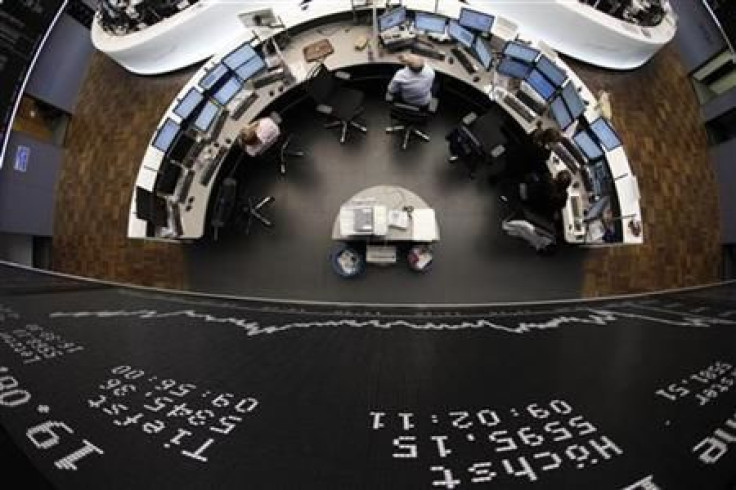Stocks Take Beating on Grim U.S., China, Germany Data

A grim outlook for the U.S. economy from the Federal Reserve and signs of a slowing China and Germany drove world stocks sharply lower on Thursday and pushed investors into safer currencies and government bonds.
European stocks tumbled nearly 4 percent, helping drag global equities to a fresh one-year low.
The dollar rose to a seven-month high against major currencies as a broad sense of aversion to risk swept through financial markets.
The Fed set the ball rolling on Wednesday when it launched Operation Twist, a plan to lower borrowing costs by selling or not renewing short-term debt in favor of longer bonds.
The move was expected, but the Fed's statement of the rationale behind it was stark: There were significant downside risks to the U.S. economy.
It seems the market doesn't believe Operation Twist is enough to kick start the spluttering economy ... (and) a very downbeat outlook ... seems to have unsettled markets even further, said Ben Potter, market strategist at IG Markets.
Concern was increased on Thursday when HSBC's China Flash PMI showed the factory sector shrank for the third consecutive month in September, pointing to a slowdown in the world's second-largest economy.
Business activity in Germany also grew at its weakest pace in more than two years in September and new orders fell for a third month.
World stocks as measured by MSCI were down nearly 2.5 percent to a new year low, making for a more than 14 percent year-to-date loss. The more volatile emerging markets stock index was down 4.7 percent for a 22 percent 2011 loss.
In Europe, where questions about the ability of the euro zone to manage some of its countries' heavy debt remain, stock losses amounted to a 21 percent fall for the year-to-date.
The FTSEurofirst 300 fell 3.9 percent.
Japan's Nikkei closed down 2.07 percent.
SAFETY FIRST
The mood drove investors to seek relative safety. The yield on 30-year German debt sank to a new record low as investors bought the paper.
The 30-year German benchmark yield fell to 2.538 percent, passing the previous lows seen in late August 2010.
Yields on 10-year U.S. Treasuries, the target of Fed activity, were down below 1.8 percent.
On currency markets, the dollar climbed to a seven-month high against major currencies.
The dollar's strength and the risk aversion that we have seen in recent weeks have picked up steam, said Tohru Sasaki, head of Japan rates and FX research at JPMorgan Chase.
The euro was at a seven-month low of $1.3462.
Indebted Greece, struggling to avoid default, made new budget-cutting pledges on Wednesday aimed at securing the next slice of bailout funding from international lenders.
As ever, the question is, will these measures be implemented and maintained by the current government and the governments to come?, Societe Generale strategists wrote in a note to clients.
(Additional reporting by Joanne Frearson, Antoni Slodkowski and William James)
© Copyright Thomson Reuters 2024. All rights reserved.











